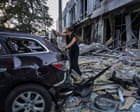
In a world where tensions and conflicts often mask the underlying hope for peace, recent developments in Ukraine and Gaza offer a poignant reminder of the struggles and aspirations for resolution. The juxtaposition of drone strikes in Ukraine and the humanitarian concerns in Gaza highlights the global call for peaceful dialogue and humanitarian justice.
In Ukraine, the air was punctuated by the hum of drones as news emerged of Russia launching 42 overnight strikes. This occurred just hours after both nations agreed to participate in peace talks, slated to occur in Istanbul on Wednesday. The attacks resulted in injuries to at least a dozen individuals, underscoring the continued volatility in the region amidst efforts towards dialogue. The commitment to negotiations reflects a glimmer of progress in the ongoing conflict, signifying a shared recognition of the urgent need for peace.
Amidst these developments, an investigative report has cast a spotlight on the involvement of Russian youth in the nation’s military-industrial activities. The revelations indicate that children in Russia have been engaged in the design and testing of drones. Through competitions that begin with seemingly innocuous video games, these young talents find themselves entwined in Russia’s war efforts in Ukraine. This approach, cloaked in the guise of patriotic education, raises ethical questions about the militarization of youth and the future implications for the region’s peace and stability.
While Ukraine grapples with the immediate effects of these attacks, a different but equally urgent humanitarian issue is unfolding in Gaza. Cardinal Pierbattista Pizzaballa, the Catholic Latin patriarch of Jerusalem, spoke out against Israel’s policies in the territory following a recent visit. Describing the situation as “morally unjustifiable,” Cardinal Pizzaballa expressed grave concerns over the blocks on food and medical supplies, which he indicated were exacerbating the already dire conditions in Gaza.
His visit to a church that had been attacked by Israeli forces last week was not only a mission of solidarity but also an effort to highlight the critical need for humanitarian aid and justice. The cardinal’s statements bring attention to the broader consequences of the blockade, which has resulted in severe food shortages, described as a “sentence” for starving Palestinians. In the face of such adversity, the call for compassion and constructive dialogue rings louder.
These developments in Ukraine and Gaza, though regionally distinct, are united by the common threads of human resilience and the quest for peace. Peace talks in Istanbul between Ukraine and Russia offer a platform for potentially transformative dialogue, representing hope that can transcend borders and conflicts. Similarly, the call for humanitarian justice in Gaza emphasizes the ongoing struggle for dignity and survival against a backdrop of political and military challenges.
The world watches closely as these regions navigate their respective trials and tribulations. There is a collective yearning for peace that bridges geographical and cultural divides, unifying humanity in its quest for a future where conflicts are resolved through dialogue and compassion. As these stories unfold, they remind us of the importance of perseverance, empathy, and the unwavering commitment to peace, which rests not merely in the agreements of world leaders, but in the hearts of individuals striving for a better tomorrow.
Source: {link}
